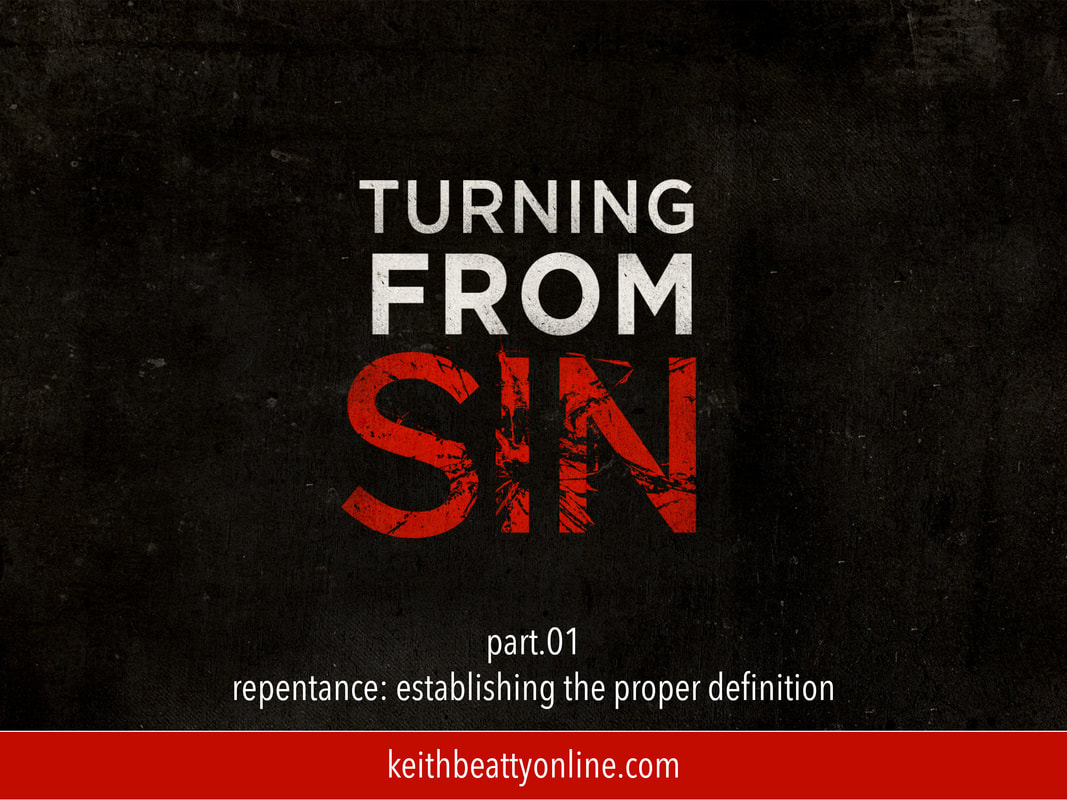|
This is the first installment in a new series of blogs regarding "Turning From Sin." part.01- repentance: establishing the proper definition To effectively turn from sin, we must establish a life-applicable definition for one very distinct term: repentance. There is a clear call in Acts 2:38 to "Repent and be baptized, every one of you, in the name of Jesus Christ for the forgiveness of your sins. And you will receive the gift of the Holy Spirit.”
Of course, to “repent” means that we are to ask forgiveness for our sins...Right? Consequently, the word “repent” could possibly benefit from closer examination, because it has nothing to do with "asking forgiveness for anything. With the revealing of that information, three church steeples just exploded across the Bible belt, and mainstream Christianity will have to rewrite quite a few self-help books on how to live happily for Jesus while confidently living out a life of deliberate but “easily forgivable sin,” while seated comfortably in the Lordship of our own will. But, what does the word “repentance” really mean? The word repent is the Greek verb “metanoeó.” It’s a compound word, and it joins “metá” (changed after being with) and “noiéō” (think different after). Literally, it means a change of mind, or to think differently afterwards. Notice, there’s no component of this compound word that even hints at “asking forgiveness.” None. Repentance is a definitive redirection of our thinking toward something, specifically where our actions are concerned. It does not illustrate a moody or lukewarm state of evaluation that is subject to change under the slightest application of outside pressure. We should be keenly aware that shedding tears over our sin, feeling conviction, and even the confessing of our sin all fall outside the parameters of the real definition of the word. We can experience conviction, cry, and confess all we want. If we keep returning to the same sins, we haven’t repented of them. Repentance is deliberate, purposed, and settled. If taken in its true form, repentance illustrates a solid and intentional changing of our mind from one thing (or way) to another. So, the command to “repent of our sins” is not a call to ask forgiveness for them, but it is a call to “change our mind” about further participation in sin from that point forward. An interesting side note…the word “repent” was also used by the Greek military as a command to “about-face,” or “turn around.” Moreover, there was no call to stop marching. So, the term “repent” was called out to soldiers while they marched, instructing them to turn 180 degrees from their current direction of travel, and then to continue marching forward in a new direction. They had altered course, a definitive change of direction, and marched away…leaving their old destination behind them. Let’s be sure to understand the importance of real repentance and not cheapen it by a more comfortable definition of our own terms. I thank God for the forgiveness of sins, but we must learn that true repentance involves a discipline changing of our mind regarding our involvement in sin. Next Blog: Repentance and Culture
4 Comments
8/30/2019 10:18:33 pm
Establishing the proper definition is the best way to avoid misunderstandings. I know that a lot of people will argue about this, but that is my point. If we do not have a proper definition in our hands, then how will we ever make this right. I want people to understand what I am trying to say, because that is the entire point of my argument. Resolution is better than conflict, believe me, brother, you do not want to fight over this.
Reply
12/15/2020 05:25:58 pm
I was looking for some takes regarding this topic and I found your article quite informative. It has given me a fresh perspective on the topic tackled. Thanks!
Reply
Phil Zinck
7/5/2022 02:54:05 am
Good morning, this is such an important word to understand in the pursuit of God’s Truth. I appreciate the imagery of repenting soldiers still marching but away from their original destination, back to where they started. Reminds me that there is a daily process in repentance, and not a magic moment in a church service.
Reply
Ricky
3/2/2023 05:38:07 am
Enjoyed the message on repentance and I like the story about the Greek Army. Thanks!
Reply
Leave a Reply. |
AuthorKeith Beatty is a Worship, Missions and Media Pastor living in North Alabama. He's excited and very humbled to be a follower of Jesus Christ! Archives
April 2023
Categories |


 RSS Feed
RSS Feed